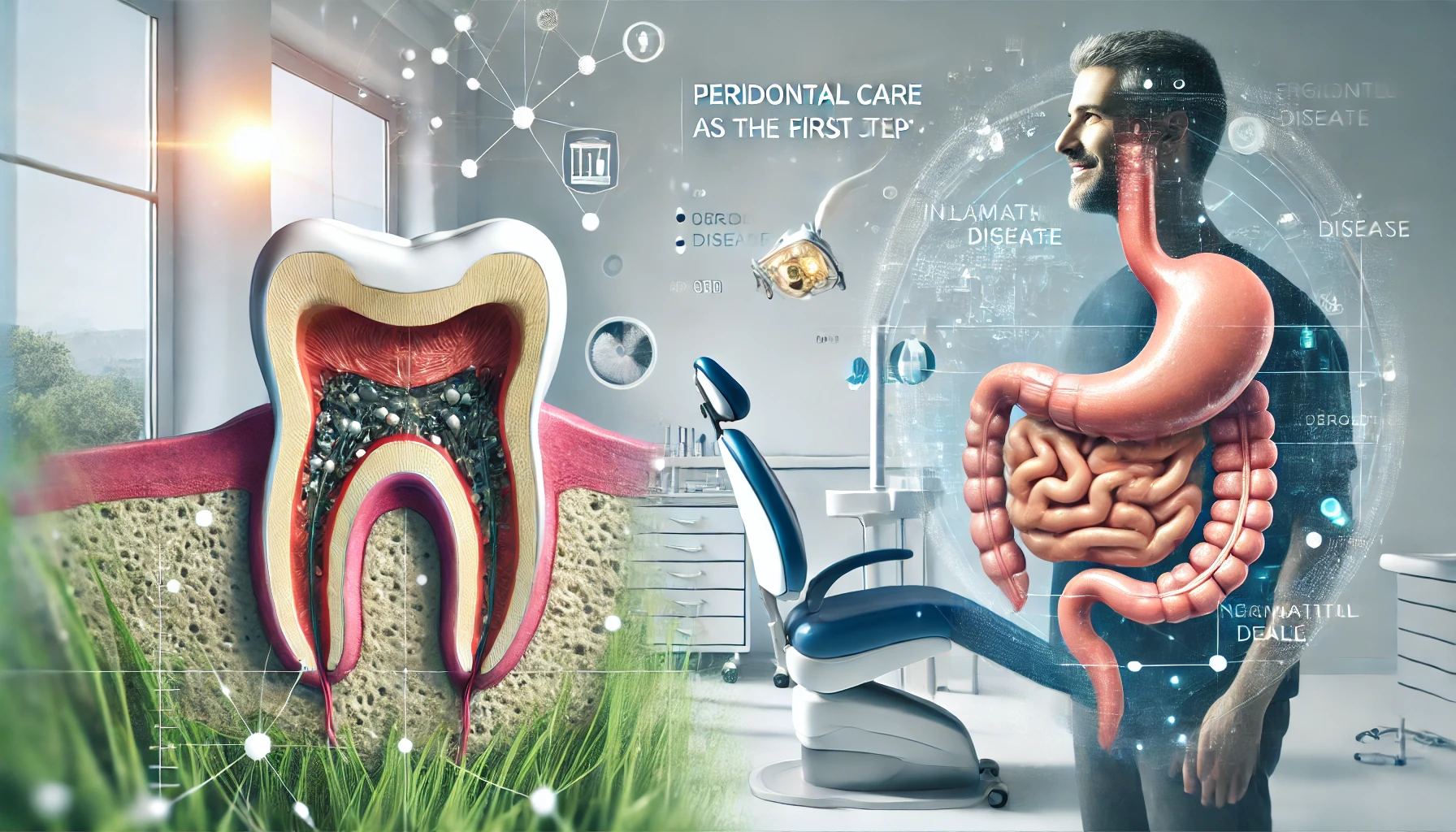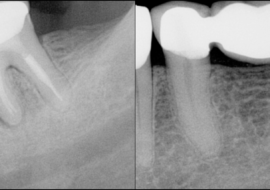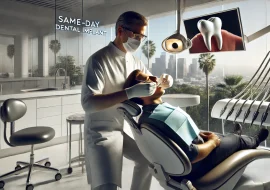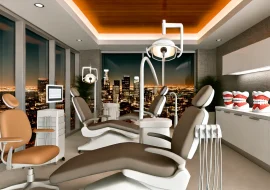
Periodontal Care and the Gateway to the Digestive System
It should be obvious but we don’t always realize that our teeth, gums, and saliva represent the very first step of the digestive process. Thus, periodontal disease treatment in Beverly Hills, gastroenterology, and colorectal care are all closely related. Even so, the connections between periodontal health and issues involving the digestive tract have not gotten much attention until recently.
Oral Health and IBD
A 2024 Portuguese study discussed in Dentistry IQ shows a rather stunning relationship between periodontal issues and IBD (inflammatory bowel disease).
Specifically:
“The prevalence of periodontal disease was 55.3% and 69.4% among patients with Crohn's disease and ulcerative colitis [and]…a staggering 88.1% of patients with IBD needed dental treatment and 38.1% required prosthetic rehabilitation [dentures, bridges, or dental implants with crowns].”*
Another study in the United States found a relationship between lower numbers of beneficial bacteria found in patients’ stool samples in patients who had experienced periodontal problems. (Fans of the TV medical comedy series, Scrubs, might remember the song, “Everything Comes Down to Poo.” It really kind of does.)
Stress and the Gateway to the Digestive System
On a related point, we’ve all experienced how stress influences the lower digestive system – from nervous stomach rumbles and acid reflux to urgent needs to use the bathroom while under excessive stress. However, stress also influences our oral health.
We already know that stress-related teeth grinding can lead to multiple problems, including tooth wear and potential gum recession, if left unaddressed. We also know that stress and other issues might lead us to abuse drugs like alcohol, opioids, and (worst of all) crystal meth, which can devastate our oral health
But is there anything less obvious? Perhaps. A 2016 study pointed out the following:
“Chronic stress contributes to high allostatic load that can lead to the dysfunction of physiological systems critical to homeostasis, and thus, affect the underlying mechanisms of disease progression, more generally.”
Translated into English, this means that stress makes us more vulnerable to disease from head to toe in ways we don’t fully understand. It may be safe to assume that it also applies to periodontal disease. That might seem thin but medical science has proven that stress can impact our health in many ways, it’s just that we’re still only starting to learn the hows and whys. We can’t prove it yet but there may be connections between stress and the various bacteria – both harmful and beneficial – that inhabit the mouth.
Eating Right
While oral health specialists like our team here at Beverly Hills Periodontics & Dental Implant Center are constantly reminding the public about the importance of regular flossing and brushing with fluoride toothpaste, our choice of foods and drinks can be every bit as important to our oral health as it is to our systemic health.
So, what should you eat? You probably already have an idea of what we’re going to suggest, but the words of popular food guru Michael Pollen may provide the best summary. “Eat food, not too much, mostly plants.” Yes, veggies, legumes, and whole grains are good for your gums and teeth as well as your digestion and major organs like the heart and brain. Foods that are mostly plants tend to include the vitamins and minerals you’ve heard a lot about but also micronutrients that can help limit oxidation – the bodily process we are increasingly associating with pain and disease.
Meat proteins, eggs, and dairy can also play an important role. While we should all watch our consumption of red meat, in moderation lean cuts especially can be healthy and contain some vitamins that are hard to find in other foods. Poultry may be lower in fat while also providing lots of high-quality protein and other nutrients. Salmon and eggs are rich in calcium, vitamin D, and healthy omega-3 fats crucial for the health of bones, teeth, and gums. While too much dairy can be an issue, there is no denying it is an excellent source of calcium and vitamin D, crucial to the health of teeth and bones.
That is not to say that vegans should worry. They tend to have fewer issues with such matters as obesity and type 2 diabetes. Moreover, soy products, nuts, beans, and other plant-based foods, as well as supplements, can typically ensure complete nutrition for people who prefer not to eat animal products.
Most everyone knows that fast food, candy, chips, and other highly processed snacks aren’t great for us but they may not be the only foods we should try to keep to a minimum. Foods once seen as reasonably healthy, such as white rice and deli meats, have also been the subject of a great deal of scrutiny lately. Studies have shown that diets high in so-called ultra-processed foods are associated with earlier mortality.
Of course, no matter what you eat, brushing and flossing once to twice a day can be very beneficial. Just skipping this step can start a cascading series of health issues that won’t be limited to your mouth.
Exercise
People expect advice to exercise from their family physicians or medical specialists but not so much from periodontists or dentists. However, the more we learn about the body, the more we realize that everything is connected and that exercise is essential.
Vigorous exercise counteracts the dangerous sedentary lifestyles most of us lead. If you are dealing with a weight issue, like so many of us, reducing your caloric intake will indeed help you lose pounds. However, you’ve likely learned the hard way that reducing your food intake is a lot easier said than done without assistance from surgery or newer drugs that should be used with great caution. Meanwhile, exercise is by far the best means we have of counteracting at least some of the effects of being overweight or obese. Moreover, sometimes it’s easier to start doing something challenging than to stop eating. In many ways, people with weight issues are programmed to overeat and metabolize food slowly. Sometimes, starting by trying to burn more calories is easier than dramatically cutting calories – though doing both is always best!
Exercise does more than improve muscle strength and the cardiovascular system, it also helps us to handle stress and has been proven to reduce or even prevent anxiety and depression. We’ve already explained how dangerous negative stress can be for our mouths and bodies, so reducing it through exercise can only help.
We know that the idea of starting to exercise for the first time in decades – or your entire life! – can be daunting. However, no matter your situation, you can always do something. First, talk to your doctor and develop an activity plan that will usually begin modestly and gradually increase. Soon, you should be feeling better and perhaps able to perform formerly difficult daily tasks with ease. You might even start to look better and feel more confident. Believe it or not, all of this is likely to also help any digestive issues you have and prevent or reduce oral health problems – if you brush at least twice daily, that is!
Extra Steps for People with Gum Disease
We are all used to hearing dentists and doctors arguing on behalf of regular visits but that especially applies to people with frequent gum problems. When we talk about periodontal maintenance, that includes visiting a periodontist and dentist three or four times per year.
Lost teeth, bad breath, and other seemingly cosmetic issues associated with periodontal illness are more than merely unpleasant symptoms, they can do enormous harm to our overall quality of life. By impacting our ability to be confident while working or socializing, these symptoms can also add to stress as well as illnesses like depression and anxiety – yet another way to start a vicious cycle of ever-worsening health. People with ongoing periodontal issues must take a proactive approach.
Start the Virtuous Cycle with Beverly Hills Periodontics & Dental Implant Center
The time to start caring for your digestive and overall health from top to bottom is now. As you age, the risks only increase. Regular medical checkups are important for all of us but dental check-ins are no less essential If you are experiencing such telltale signs of gum disease as persistent bad breath (halitosis) and bleeding gums – even just a little bit of pinkness on your toothbrush, it is time to get your issues addressed immediately.
Dr. Peiman Soleymani and his team at Beverly Hills Periodontics & Dental Implant Center are here to provide the highest level of periodontal and restorative oral health care. If you are dealing with more advanced issues such as missing teeth and inflamed gums, rest assured that it is never too late to turn the tide.
Multiple or single dental implants can restore your smile while protecting your health with maximum convenience. Dr. Soleymani is a nationally respected leader in the field of periodontology and implantology. Especially if you live in the Greater Los Angeles and Beverly Hills area, he is your best choice when periodontal problems and lost teeth are an issue.
To get started, you can reach out by calling the phone number on your screen or using our contact page.
* “Your patients’ poor oral health may be increasing their risk for IBD,” Sarah Butkovic. Dentistry IQ, June 12, 2024.







Recent Comments